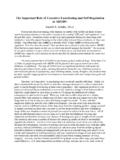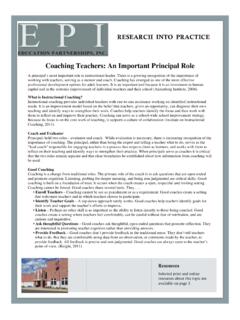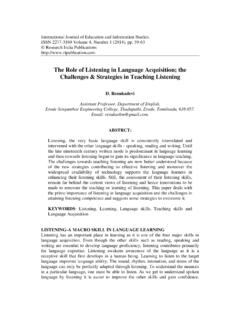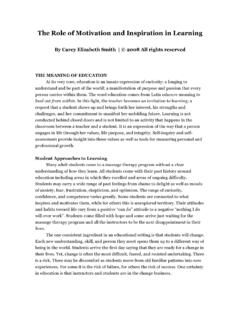Transcription of Why Biomass is Important -- The Role of the USDA Forest ...
1 1 Acknowledgement: I want to thank Dr. Bryce Stokes, Dr. Marcia Patton-Mallory, and Dr. Marilyn Buford with the USDA Forest Service for their contributions to this paper. Why Biomass is Important -- The Role of the USDA Forest Service in Managing and Using Biomass for Energy and Other Uses Dr. Ann Bartuska Deputy Chief, Research & Development USDA Forest Service Washington, DC Introduction Across the United States, major discussions are taking place regarding the relationships among energy, economic growth and security, the environment, and national security.
2 A critically Important part of these discussions is the intersection of energy security, environmental quality, and economic health (Fig. 1). Integrated production, management, harvesting, and conversion of woody Biomass to efficiently produce energy and replace a significant portion of fossil fuels are fundamental to optimizing this balance. Our Nation s forests are a strategic asset in this arena. As a Nation, we use science-based conservation and management to renew and restore our forests and sustainably enhance our economy and social well being. Forest Service, university, and industry researchers and other partners have led the way and have worked together to better restore, enhance, manage, use, and protect our Forest resources.
3 Our Nation s forests provide clean water and air, critical habitat, and abundant recreation opportunities to the American people. Our nation has vast Forest resources that reflect the American conservation ethic and our history of science-based management. Biomass is a complex issue that will need to be addressed through many disciplines and integrated programs involving wood science, silviculture, engineering, climate change, water and air quality, economics, and many more. Woody Biomass is an integral component of Forest management that offers both problems and opportunities for managers, landowners, and for the nation. The issues concerning Biomass utilization involve challenging science questions and policies, and technical barriers.
4 There are opportunities to use our forests as a cornerstone of the biobased revolution, a fundamental change in the way we produce and conserve energy and industrial products ( Biomass Technical Advisory Committee 2002). Goals of Biomass for Energy Enhance National security Benefit the environment Balance trade deficits Bolster rural economics Taken from speech at 25x 25 Summit II, March, 2006, Washington, DC. Woody Biomass : trees, including limbs, tops, needles, and other woody parts, wood and wood wastes, residues, and municipal wood wastes. 2 We can derive products as diverse as fuels, lubricants, heat and electricity, chemicals, food, feed, building materials, paper, clothing, and much more from biological resources.
5 Biomass will have an Important role in energy, the environment, and economy of the future. Energy, Environment, Economy and Forest Management Energy, Environment, and Economy the three big E s are so intertwined that it is almost impossible to discuss any one independent of the other two. Our dependence on oil brings with it concerns for long-term environmental impacts, energy security, and rising costs of living. Biomass for energy, especially biofuels, has positive attributes that contribute to a healthy environment and economy. Biomass utilization can reduce Forest management costs, help mitigate climate change, reduce risks to life and property, and help provide a secure, competitive energy source. Shifting to a homegrown, renewable energy economy provides opportunities for growth and expansion, especially for rural communities as these renewable feedstocks are directly connected to the land, primarily agricultural and forestry lands.
6 Our forests are a renewable strategic asset in meeting the Nation s need for secure and affordable energy, environmental services, and economic health. Our ability to sustainably manage our resources without degradation to ensure secure and affordable access to goods and services is still the most critical priority for the future1. Forestry has always had a crucial role in protecting the environment and securing the economy. Now forestry has a significant role and opportunity in providing renewable energy, and liquid biofuels that can support our large transportation system. Sustainability explicitly considers both present and future generations, and the triple bottom line of social, economic and environmental factors.
7 Sustainability is place-based. In discussing sustainability we recognize that places can be as small as homes or communities, and as large as the earth itself. We seek economic actions that fully consider society s need and operate in a way that promotes and enhances the environment. Increased use of renewable Biomass for fuels and biobased products as replacements for fossil fuel intensive commodities fits within this integrated context by providing substantial societal benefits. Energy Dependence on oil is an environmental concern and dependence on foreign oil weakens our national security and our economy. Oil imports and costs have climbed to record highs (see Figs. 22 and 33). The cannot continue to rely on foreign wells and 1 Ecosystems and Human Well-being: Opportunities and Challenges for business and Industry.
8 2 Energy Information Administration, Annual Energy Review 2004, Report No. DOE/EIA-0384(2004) Posted: August 15, 2005, 3 facilities for petroleum, especially for our transportation fuels. About 59% of our current oil use is imported, with approximately 20% coming from the Persian Gulf. America is a mobile country our economy is built on transportation systems; our quality of life is dependent on access to low-cost transportation. Currently, excluding hydropower, only about 4% of our energy is from renewable sources and primarily produces power and heat.
9 About 10% of Biomass energy is being used for transportation fuels and that is primarily corn ethanol. We have long used agricultural and forestry Biomass , primarily Forest and wood waste, to generate electricity, supply heat and steam power, and to heat homes. The critical opportunity before us is to displace petroleum consumption using biobased products and biofuels from Biomass . Additionally, energy can be conserved by using more energy-efficient housing products and manufacturing processes. A question that has been asked is whether we have sufficient supplies of Biomass to displace significant amounts of fossil energy. A recent joint Department of Energy (DOE)/U. S. Department of Agriculture (USDA) study (Perlack and others 2005) showed that the can realistically displace 30% of our current petroleum consumption with Biomass an amount approximately equivalent to one billion dry tons of Biomass (Fig.)
10 4). There are several aspects to energy and Biomass that are Important attributes to set the stage for discussions in this paper: Creating transportation fuels from Biomass is technically and politically possible; Using fuels from Biomass is the only feasible, renewable, mass transportation fuel alternative for the short- to mid-term; Being home grown from our lands provides improved rural economic opportunities now and into the future; Having our own conversion facilities in a new industry improves energy security, National security, and economic health; and Having the needed feedstock supply is dependent on America s working farms and forests. Brazil has already gone to an ethanol economy. They have the largest commercial application of Biomass in the world, using sugar cane to produce ethanol.

















